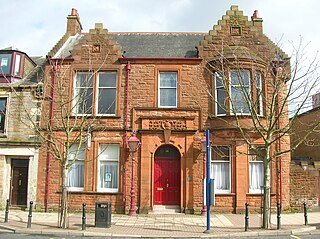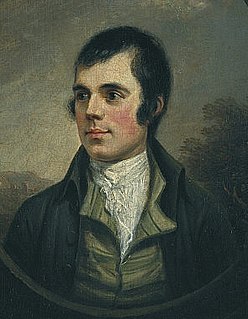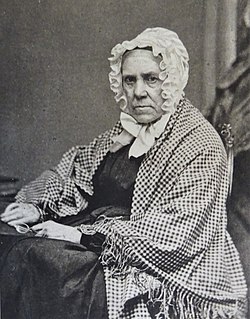Adam Armour may refer to:
- Adam Armour (soccer) (born 2002), American soccer player
- Adam Armour (Robert Burns) (1771–1823), brother-in-law of the poet Robert Burns and builder
Adam Armour may refer to:

Under Armour, Inc. is an American sports equipment company that manufactures footwear, sports and casual apparel. Under Armour's global headquarters are located in Baltimore, Maryland, with additional offices located in Amsterdam, Austin, Guangzhou, Hong Kong, Houston, Jakarta, London, Mexico City, Munich, New York City, Panama City, Paris, Pittsburgh, Portland, San Francisco, São Paulo, Santiago, Seoul, Shanghai, and Toronto.

Mauchline is a town and civil parish in East Ayrshire, Scotland. In the 2001 census Mauchline had a recorded population of 4,105. It is home to the National Burns Memorial.

Jean Armour, also known as the "Belle of Mauchline", was the wife of the poet Robert Burns. She inspired many of his poems and bore him nine children, three of whom survived into adulthood.

Robert Burns, also known familiarly as Rabbie Burns, was a Scottish poet and lyricist. He is widely regarded as the national poet of Scotland and is celebrated worldwide. He is the best known of the poets who have written in the Scots language, although much of his writing is in a "light Scots dialect" of English, accessible to an audience beyond Scotland. He also wrote in standard English, and in these writings his political or civil commentary is often at its bluntest.
Janet, Jennie or Jenny Clow was a domestic servant to Mrs Agnes Maclehose, née Craig (1759-1841), the Clarinda to Robert Burns' Sylvander. She was the daughter of Andrew Clow and Margaret Inglis from Fife and was the youngest of eight children. Her mistress sent her to deliver a letter to the poet and he seduced her.

Agnes Maclehose, or Agnes Craig, known to her friends as 'Nancy' and to Robert Burns followers as Clarinda, was a Scotswoman who had an unconsummated affair with Burns during 1787-88, on which he based the song, "Ae Fond Kiss" (1791). The pseudonyms of her 'Clarinda' to his 'Sylvander' were adopted by the pair for confidential correspondence purposes. Maclehose has been various styled, including 'McLehose' and 'MacLehose'.

Richard Brown or Ritchie Broun in Scots was born in Irvine. He was a sea captain and a one time friend of Robert Burns who is credited by Burns as the being the person who "encouraged me to endeavour at the character of a Poet."

The Irvine Burns Club, based at the Wellwood Burns Centre & Museum, was founded on 2 June 1826 and is one of the world's longest continuously active Burns Clubs. At least five personal friends of Robert Burns were among the group of local gentleman, whose idea it was to form the club. Irvine in North Ayrshire is an old market town and port situated on the west coast of Scotland, approx 14 miles north of Ayr.

Jessie Lewars also known as Mrs. James Thomson, was the youngest daughter of John Lewars, a supervisor of excise. Following the death of her 69-year-old father in 1789, Jessie was only 11 years old, when she and her brother John moved to a house in Millhole Brae that lay opposite that of Robert Burns in Dumfries. Jessie was a close Burns family friend and when nearly at the age of eighteen helped the family by nursing Robert in the days leading up to his death and doing the domestic chores.

Robert Burnes or Robert Burness was a paternal uncle of the poet Robert Burns. He left the family farm of Clochnahill or Clokenhill in Kincardineshire with his younger brother William Burnes, and found work at the Lochridge or Lochrig limestone quarries and lime kilns that lay near Byrehill Farm near Stewarton. He was a teacher, a gardener later in life and a land steward on the nearby Robertland Estate, possibly through the influence of his nephew. Robert Burns referred to his him as Poor Uncle Robert upon his death in 1789.

The Cincinnati Dutch Lions FC was an American amateur soccer club based in Cincinnati, Ohio, and playing home games in the suburb of Highland Heights, Kentucky. Founded in 2013, the team played in USL League Two. The club went into hiatus during the 2020 COVID-19 pandemic.

The Robert Burns World Federation is a literary society based in Kilmarnock, Ayrshire, Scotland, aimed at educating the public about the life, poetry and works of the poet Robert Burns. It is a Scottish Charity and a company limited by Guarantee. The Federation links existing Burns Clubs and similar groups, giving a unique number to affiliated Clubs, which is then used by them in their promotion and identification. Their ongoing intent is to provide a way for clubs to link together and enjoy the mutual benefit of association, communication and shared mission. It was founded in 1885
Adam Armour (1771–1823) was the younger brother of Jean Armour and therefore the brother-in-law of the poet Robert Burns. In addition, being married to Fanny (Frances) Burnes, he was also related to the poet through his father-in-law 'Poor Uncle Robert', who lived at Stewarton.
James Armour was a master mason and father of Jean Armour, and therefore the father-in-law of the poet Robert Burns. His birth year was shown here as 1730. The Scotland's People database has no record of this year of birth for a James Armour. Wikitree and several other data sources have his birth date as 10th/24th January 1731. The Scotland's People database has this record but showing his baptism on 24 January 1731. His birth on the original Old Parish Record is shown as 15 January 1731 to John Armour and Margrat(sic) Picken in Kilmarnock. James named his first son John which would normally be after James's father i.e. John. The chances of there being two James's born on exactly the same date exactly one year apart appear very remote and the naming of the first child seems to validate the conclusion that James Armour was born in 1731 and not 1730.

Elizabeth Burns, Elizabeth Park or Mrs John Thomson known as Betty Burns, was born in 1791 in Leith, Scotland. She was the illegitimate daughter of Robert Burns and Anna Park who was a barmaid at The Globe in Dumfries. She married John Thomson in 1808 to become Elizabeth Thomson.

Robert Aiken was one of Robert Burns's closest friends and greatest admirers. He was born in 1739 in Ayr, Scotland. His father John Aiken, was a sea captain who owned his own ships and his mother was Sarah Dalrymple, distantly related to the Dalrymples of Stair. He became a writer or lawyer in Ayr and was referred to by Burns as "Orator Bob" in his poem "The Kirk's Alarm". Robert was famous for the power, beauty and quality of his oratory as his nickname infers.

Gavin Hamilton was one of Robert Burns's closest friends and a patron. The first 'Kilmarnock Edition' of his poems were dedicated to Gavin Hamilton.

John Richmond (1765–1846) was one of Robert Burns's closest friends and confidants. He was born in Sorn parish at Montgarswood, Ayrshire, Scotland. His father, Henry Richmond, was a merchant in Mauchline and owned Montgarswood Farm that lies near Sorn. This farm passed to James, John's brother, having once been farmed by William Fisher, Burns's Holy Willie.
Adam Edouard Armour is an American professional soccer player who plays as a defender for MLS team Charlotte FC.
Jean Lorimer (1775–1831) was a friend of the poet Robert Burns, often referred to by him as the "Lassie wi' the lint-white locks" or "Chloris". Lorimer was born at Craigieburn House on a small estate near Moffat and from 1788 to 1791 was a neighbour of Burns when he was living at Ellisland Farm, her father's new farm being at Kemmishall or Kemys Hall, Kirkmahoe Parish, two miles to the south of Ellisland on the opposite bank of the Nith. Burns commented "The Lady on whom it was made, is one of the finest women in Scotland" in a letter to George Thomson, enclosing one of the two dozen or so songs that he wrote for her. They first met when she was a teenager through his Excise duties bringing him to their farm.